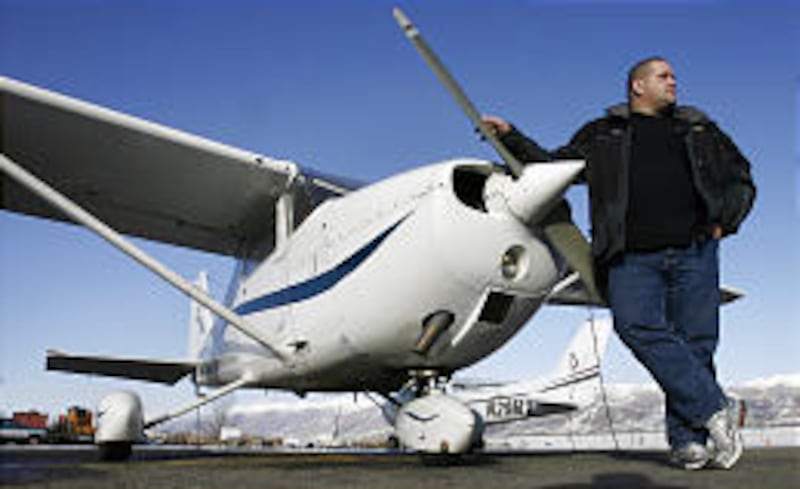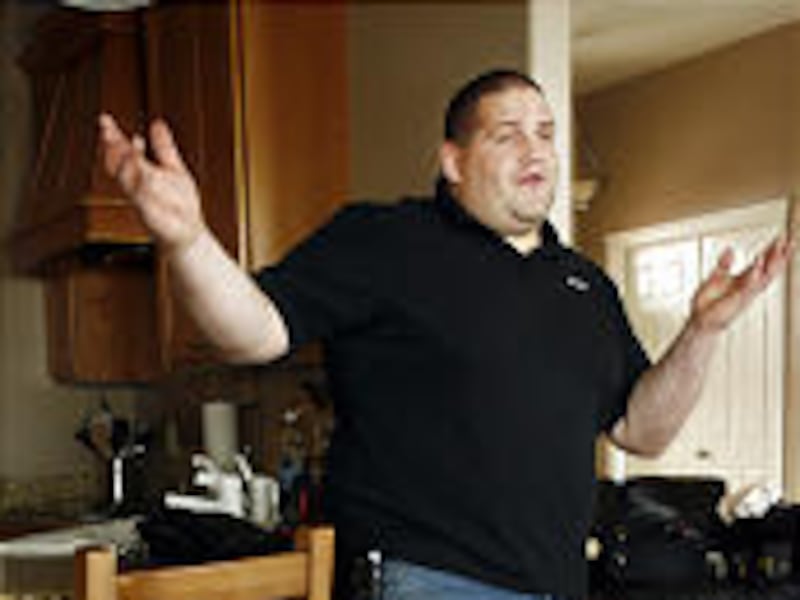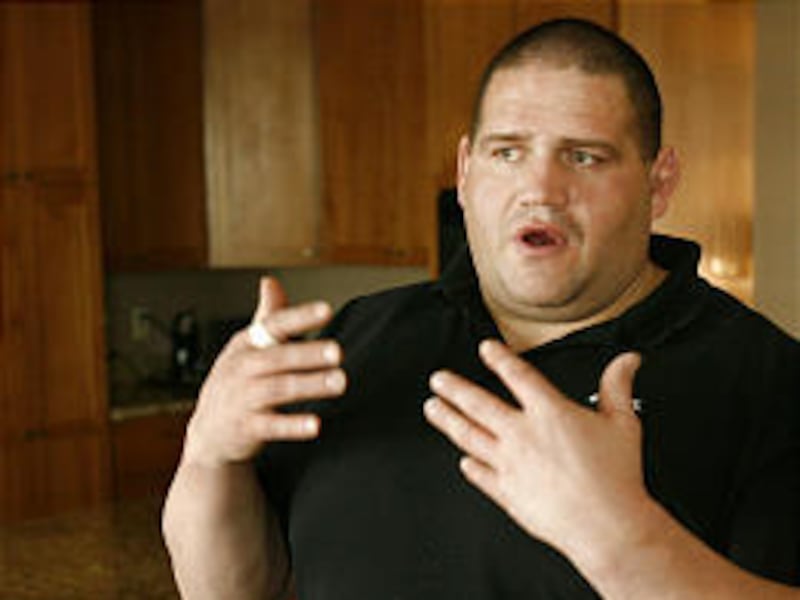NORTH SALT LAKE — When Olympic champion Rulon Gardner was a young boy, the town doctor in Afton, Wyo., told his father one day, "He's just one of those kids who's going to be accident prone."
Gardner has spent the past three decades proving him right.
After surviving accidents with snowmobiles, automobiles and motorcycles, Gardner, the Olympic heavyweight wrestling champion in 2000, made it a clean sweep of transportation disasters by surviving a plane crash in Lake Powell last weekend.
As he jumped out of the sinking plane into the icy water, Gardner said he was struck by one recurring thought: This isn't happening again!
This is getting to be a habit. Five years ago, Gardner crashed a snowmobile into an icy lake, leaving him soaked and stranded. He spent one night shivering in minus 25 degree temperatures, waiting for help.
On Saturday, he was back in the wilderness, soaked and stranded in freezing temperatures and waiting for help.
"I'm still wondering if it really happened," Gardner said in his North Salt Lake home Monday morning.
Gardner, who has nearly completed a pilot's license, was flying as a passenger with Randy and Leslie Brooks on Saturday afternoon over New Hope Bay in Lake Powell on a sightseeing tour.
Randy, who according to Gardner has 3,000 hours of flying experience, decided to drop down close to the water. Too close, as it turned out.
"Hey, watch your wheels!" Leslie told his brother, a split second before the left wheel struck the water.
The plane veered left and skipped off the water again, this time stopping the propeller. The plane struck the water again and came to a stop.
"We went from 150 miles per hour to zero in about one second," Gardner recalled.
Gardner, who struck his head on the fuselage on impact, heard the brothers yell instructions — "Unbuckle yourself and get out!" They plunged into the chilly water.
Gardner began to flounder immediately, his head repeatedly going under the water. Not only did he have to keep his 300-plus pounds afloat, he also was trying to swim while holding a cell phone, an oversize wallet and a coat in his hands. ("I was thinking I didn't want to be stranded like I was before, so I wanted the cell phone," he said).
"You guys are going to have to help me," Gardner said to the brothers, who had begun to swim away. "I'm having trouble."
Randy swam back and told Gardner to remove his shoes and empty his hands.
"It's not worth your life; it's just stuff," he said.
Gardner pocketed the phone and discarded his wallet and coat.
"I was done," Gardner recalled. "Without them, I wouldn't have made it."
With no boats in sight, they swam for a distant beach in the 44-degree water, which is easily cold enough to bring on the effects of hypothermia within 30 minutes. Gardner became fatigued quickly as he attempted to use a freestyle swim stroke in the water and considered swimming back to the plane, which remained afloat for several minutes; the brothers suggested that he use a slow, methodical backstroke.
"I would take 100 strokes and then look (at the beach)," he said. "Then I'd take another 100 strokes and look. Sometimes I'd cheat and look after 20 strokes. I kept having this surreal feeling — this can't be happening again."
Gardner, who estimates they swam for one or two hours, arrived at the beach well after the brothers.
"I had no feeling in my body," he said. "Everything was numb."
He searched the area and found the brothers snuggled for warmth. He suggested they stand up and move to a spot in the sunlight to dry their clothes. It was about 4:30 p.m.
They saw a couple of boats that evening, but they were too far away. At one point, Leslie said to Gardner, "You've been here before. We're going to make it, aren't we?" He assured them they would.
The brothers, soaked and wearing only T-shirts and jeans in temperatures that dropped into the mid-20s, slept on top of each other, and Gardner pushed up against them for warmth.
"I was blocking the wind," he said.
The next morning they were spotted by fishermen in a passing boat. They gave their own coats and hats to the castaways and put Gardner in the middle of the boat. They were eventually ferried to the Bullfrog Marina by park rangers and then retired to a houseboat to clean up and rest. Gardner never did go to the hospital. Later they flew to Spanish Fork, with a stopover in Fillmore because of poor weather.
By Monday morning, Gardner was in his home, fielding calls from the national TV and radio networks. He is scheduled to appear on "Good Morning, America" and the "CBS Morning Show."
The National Transportation Safety Board said Monday it is investigating the crash.
"We're just now starting to get to the point where we can get some interviews and gather some data," said Jim Struhsaker, a senior air-safety investigator with the NTSB.
Preliminary interviews have been conducted with some of the men involved in the crash, he added.
The Cirrus SR22 has not yet been found, the National Park Service said Monday.
"It sank underwater," said Kevin Schneider, a spokesman for the Glen Canyon National Recreation Area. "It's probably in about 200 feet of water."
Schneider said rangers would like to see the plane recovered, and would work with the owner and his insurance company to get it salvaged.
Schneider said the survivors were lucky — they could have died three times.
"A plane crash, a swim in cold water and a night in the backcountry without any shelter or food," he said.
District ranger Steven Luckesen was more blunt.
"If these guys were a cat with nine lives, they just used up three of them," he said.
This is only the latest and most spectacular of many accidents for Gardner.
As a boy, he fell out of the back of a pickup moving 40 miles per hour and skidded across the road on his bare back.
When he was 8 years old, he accidentally impaled his stomach on a hunting arrow.
While Gardner was driving to Ricks College, his truck slid off an icy road, leaving him with scars that are still visible on his arms.
In 2002, he spent 17 hours in the Wyoming backcountry after his snowmobile dropped into a hidden lake. He lost most of a middle toe to frostbite.
Ten days before the 2004 U.S. wrestling championships, he T-boned a car with his Harley-Davidson motorcycle. He catapulted through the air and performed a front somersault as he struck the ground, then popped to his feet. He had only minor injuries.
Two days later, he dislocated his wrist in a pickup basketball game.
Then there was the time he cracked vertebrae in his neck when the great Russian wrestler Alexander Karelin dropped him on his head. But that wasn't an accident.
"Just throw another log on the fire," Gardner said. "I wonder when these adventures are going to stop."
Contributing: Ben Winslow
E-mail: drob@desnews.com



